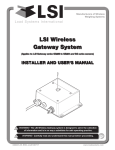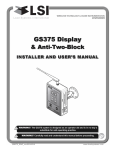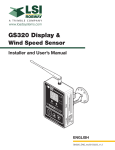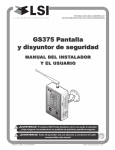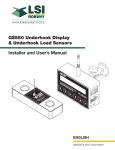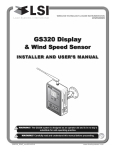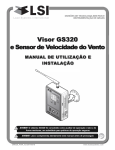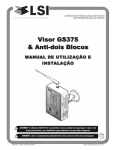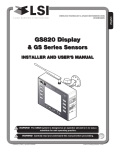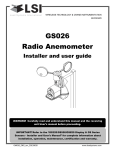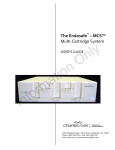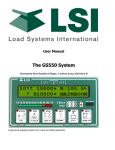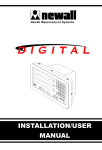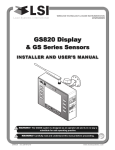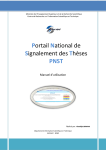Download GM221-02-05-07_ENG_rev20110612_Layout 1.qxd
Transcript
WIRELESS TECHNOLOGY & CRANE INSTRUMENTATION DIVISIONS GS221-02/05/07 System & GS Series Sensors INSTALLER AND USER’S MANUAL ! WARNING! ! The GS221 system is designed as an operator aid and is in no way a substitute for safe operating practice. WARNING! Carefully read and understand this manual before proceeding. GM221-02-05-07_ENG_rev20110612 www.loadsystems.com BEFORE PROCEEDING Read and understand the following: For your safety and that of the people that come into contact with LSI products, understand the significance of the instructions included in this guide, respect all laws and regulations and comply with applicable standards. Pay particular attention to items bearing the alert symbol ! and the following words: WARNING! ! Warning: this denotes an instruction that if not complied with may lead to serious injury or death. CAUTION! ! Caution: this denotes an instruction that if not complied with may lead to product failure or property damage. IMPORTANT! ! Important: this denotes an instruction that if not complied with may lead to product performance issues. ! WARNING! Installation must be made in compliance with LSI instructions and using LSI supplied components only. Failure to install all parts, or replacing parts or components with parts or components not supplied by LSI , may lead to system failure, serious injury or death. 2 The GS221 System TABLE OF CONTENTS 1. INTRODUCTION 1.1 OVERVIEW ........................................4 1.2 START-UP..........................................4 2. OPERATION 2.1 NORMAL OPERATION ....................4 3. CONFIGURATION 3.1 PC INSTALLATION ..........................5 3.1a System Requirements ................................5 3.1b LSI WM Configurator and USB Driver Installation ..................................................5 3.1c LSI Gateway Connection ............................5 3.2 APPLICATION OVERVIEW ..............6 3.2a 3.2b 3.2c 3.2d 3.2e 3.2f Settings ......................................................6 Communication Port ..................................6 Configuration ..............................................6 Firmware Update ........................................6 Datalogger Mode ........................................6 Sensor Settings ..........................................7 3.3 SENSOR LIST ..................................7 5. MAINTENANCE 5.1 REPLACING THE SENSOR BATTERY ........................................12 5.2 REPLACING THE SENSOR ANTENNA........................................13 6. CERTIFICATION NOTES 6.1 FCC AND IC – INSTRUCTIONS TO THE USER ......................................14 6.2 CE ....................................................15 6.2a Declaration of conformity ..........................15 6.2b CE Safety..................................................15 7. LSI PRODUCT LIMITED WARRANTY - 2009/02/16 7.1 LIMITED WARRANTY ....................16 7.2 WARRANTY SERVICES PROCEDURES ................................16 7.3 EXCLUSION OF OTHER WARRANTIES ................................16 3.4 FIRMWARE UPDATE (LSI GATEWAY ONLY) ......................7 7.4 EXCLUSION ....................................17 3.5 PACKET FORMAT ............................8 7.6 RECOMMENDED PRACTICES ......17 3.6 CHANGING SENSORS ....................9 7.7 CHOICE OF LAW ............................17 3.6a Automatic sensor settings ..........................9 3.6b Manual sensor setting ................................9 7.7a Entire Agreement ......................................17 7.5 LIMITATION OF LIABILITY ............17 4. INSTALLATION 4.1 GS221 LSI GATEWAY INSTALLATION ..............................10 4.1a Antenna Position ......................................10 4.1b Power Supply Connection ........................10 4.1c Wiring ........................................................10 4.2 WIRELESS WIND SPEED SENSOR GS020 ..............................11 TABLE OF CONTENTS 3 1. INTRODUCTION 1.1 Overview 1.2 Start-Up The GS221 LSI Wireless Gateway acts as a base station for GS series wireless sensors. Not limited to crane applications the LSI Gateway can be used in a wide range of industrial process monitoring situations. The LSI Gateway doesn't have an integrated display; it provides a bridge from GS wireless sensors to an existing CAN bus automotive or industrial automation network. The system is primarily configured via a USB cable using the PC software tool LSI WM Configurator. The LSI Gateway has been pre-configured for the system with which it shipped. It starts up with its green light flashing as it wakes up the system sensors and creates a radio communication link with each. Once a reliable communication network is established, the green light stops flashing. This process may take up to 60 seconds. Thereafter the green light flashes only when the LSI Gateway communicates with sensors. ! WARNING! The GS221 system is designed as an operator aid and is in no way a substitute for safe operating practice. 2. OPERATION 2.1 Normal operation Radio communication between sensors and the LSI Wireless Gateway is made in packets. Radio packets include both the source and destination ID numbers. This allows the LSI Gateway to send acknowledgements back to the transmitter. On start-up the LSI Gateway sends a radio packet to each of the system sensors. This communication wakes the sensor and identifies the LSI Gateway as the network controller. The sensor then sends future communications to the LSI Gateway. 4 Sensors transmit once every 60 seconds and whenever their measurement changes by more than a default threshold. Example: A wind speed sensor transmits when wind speed varies by 2 mph or more. The LSI Gateway sends a packet on the CAN bus network every time a sensor communication is received. The GS221 System 3. CONFIGURATION Configuration of the GS221 LSI Wireless Gateway requires access to a PC with a USB port; initial configuration may be easier prior to physical installation of the LSI Gateway. Refer to the Installation section as required. 5. When the installation wizard has finished installing the software, click Finish to close the wizard. When the installation is completed, the Device Manager will appear as shown below; 3.1 PC Installation 3.1a System Requirements Windows 2000, XP, Vista (32/64bit) or Windows 7 (32/64bit). 3.1b LSI WM Configurator and USB Driver Installation Before starting installation, make sure that no LSI Gateway is not connected to the computer. 1. Download the installation file www.loadsystems.com/wmconfigurator. Figure: Device Manager, Windows Vista / Windows 7 from 2. Install the file and follow the steps from the installation wizard. When transfering the files, the installation wizard will automaticly execute the USB driver installation; a Windows warning will recommend to stop the installation, ignore this warning and select Continue Anyway (Windows XP) or Install this driver anyway (Windows Vista, Windows 7). 3.1c LSI Gateway Connection Windows Vista / Windows 7: 1. Connect the LSI Gateway to the computer; the device will automatically be installed. Windows XP: 1. Connect the LSI Gateway to the computer; Found New Hardware Wizard will appear. Figure: Device Manager, Windows XP ! WARNING! The system must be installed in compliance with LSI instructions and using LSI supplied components only. Failure to install all parts, or replacing parts or components with parts or components not supplied by LSI , may lead to system failure, serious injury or death. 2. If Windows asks to connect to Windows Update to search for software, select No, not this time and then click Next. 3. Select Install the software automatically, then click Next to continue. 4. A Windows warning indicating that the driver has not been tested will recommend to stop the installation, ignore this warning and select Continue Anyway. CONFIGURATION --SECTION-- 5 3.2 Application overview Access the menus from the treeview (in the upperleft) by clicking on it. The appropriated details will be displayed in the right section of the application. Figure: Sensor List. LSI Gateway Internal Ports: The LSI Gateway internal communication ports behavior can be configured in the LSI Gateway Internal Ports section. Figure: Application overview. 3.2a • Step 1: Select the LSI Gateway internal port to be configured. • Step 2: Set the data logging options of the selected port. Settings The data from the datalogger mode can be saved on the computer disk. The data logging options set are compatible with the Datalogger Mode from the left menu. 1. Define the time interval and location folder of the logs. Data Filter: Defines the information sent to the internal communication port; All sensors: Surrounding including the system sensors. 2. Press Apply to save changes or Cancel to reload existing setting. sensors, System Sensors Only: Sensors configured in the LSI Gateway. • Step 3: Set advanced port settings. Figure: Settings 3.2b Communication Port This section displays the communication port in use, the port type and status. The Open status indicates that the communication port is in use and that the LSI Gateway is communicating information. Figure: LSI Gateway Internal Ports. 3.2c Configuration 3.2d Firmware Update Sensor List: This section displays current LSI Gateway firmware information and is used to update the firmware. Refer to section 3.4 Firmware Update. All sensors in the GS221 system are defined in the Configuration menu and are also displayed under Sensor Settings in the treeview section. Refer to section 3.3 Sensor List to add, remove or modify sensor information. 6 3.2e Datalogger Mode In this mode, live information sent by the wireless sensors is displayed. The data can be logged to files; see the 3.2a Settings section to configure this feature. The GS221 System 3.2f Sensor Settings When a sensor is selected under Sensor Settings, the following information is communicated to the LSI Gateway; • Base Station ID: The radio id number of the LSI Gateway that has the sensor programmed in its sensor list. • Heart Beat: When no change is detected in sensor value, the sensor status will be communicated to the GS221 in the interval indicated (in seconds). • Communication timeout before sleep mode: When the base station stops communicating information to the sensors, the sensors become innactive (sleep mode). The value indicated is the time (in seconds) before the sensors switch to the sleep mode. • Calibration Offset: Sensor calibration. • Calibration Scale: Sensor calibration. • Tx Sensivity: The minimum change in sensor value required to trigger communication. 4. Reload from LSI Gateway: Reload data from the LSI Gateway and display data without saving any changes (the unsaved data in the LSI Gateway will be replaced). 5. Save to LSI Gateway: Save changes in the LSI Gateway memory. Save to LSI Gateway is automaticly followed by Update sensor status. 3.4 Firmware Update ( LSI Gateway only) 1. Select Firmware Update in the treeview section. 2. In the right section, click on Browse to select the update file (extension .220) and then click Update Firmware Now. ! IMPORTANT! A firmware update will reset the LSI Gateway to the factory default configuration. Figure: Firmware update. Figure: Sensor standard setup. 3.3 Sensor List 1. In the Configuration menu, select Sensor List. 2. Adding sensors: To add sensors to the sensor list; Select a line and click on Configure selected line or double-click on the line. Enter the sensor ID and the sensor type . 3. Removing sensors: To remove any sensor from the list; Select the sensor line to remove and click on Remove selected sensor. CONFIGURATION --SECTION-- 7 3.5 Packet Format Temperature Battery level Wind speed CAN bus Destination ID Nb Bytes Type of sensor 6 = wind speed Wind speed ID number Figure: CAN Bus packet format: example of a CAN Bus log window Wind speed shown at 0x0F, which is 15 mph. Battery level is: 0x64, decimal 100% Temperature: 0x15, which converts into 21C. Wind speed sensor ID number: 0x43Fc: 17404 CAN Bus packet format Destination ID: . . . . . . . . . . . . . . . . . . . . $0405 Bit rate: . . . . . . . . . . . . . . . . . . . . . . 250kBits/s Number of bytes. . . . . . . . . . . . . . . . . . . . . . . 6 Table 2: packet format Byte 0 Description LSI Sensor type Number Load cell, load pins, etc… . . . . . . . . . . . . . . . 1 Angle sensor . . . . . . . . . . . . . . . . . . . . . . . . . 2 Boom Length from cable reel. . . . . . . . . . . . . 3 Anti-two-block switch . . . . . . . . . . . . . . . . . . . 5 Wind speed . . . . . . . . . . . . . . . . . . . . . . . . . . 6 Rope Payout from line rider . . . . . . . . . . . . . . 8 Rope Speed from line rider . . . . . . . . . . . . . . 9 Heel angle sensor . . . . . . . . . . . . . . . . . . . . 10 List angle sensor . . . . . . . . . . . . . . . . . . . . . 11 Slew sensor (swing angle) . . . . . . . . . . . . . . 12 Wind Gust (maximum wind in last 5 to 10 minutes). . . . 13 Data Range Sensor type Wind speed always (see Table: Radio sensor types) equal to 6 1 Wind speed sensor ID number MSB 2 Wind speed sensor ID number LSB 3 Wind speed value in mph Unsigned byte, between 0 and 200 4 Remaining battery life, in percentage Unsigned byte, between 0 and 100 5 Table: Radio sensor types available Sensor temperature in degrees Signed byte, between Celcius, -40C to +85C 40C & +85C 8 The GS221 System 3.6 Changing sensors If a sensor needs to be changed, the LSI Gateway must learn to recognize the replacement sensor. Two mechanisms are available to change an ID in the sensor list of the LSI Gateway. 1) Automatic ID change 2) Manual ID change 3.6a Automatic sensor settings LSI will supply a replacement sensor programmed to replace the original one. When the replacement sensor is detected by the LSI Gateway it causes the LSI Gateway to automatically update the sensor list, replacing the ID of the old sensor with that of the new; the process may take up to two minutes to complete. Note: The ID number included in the CAN bus packet will change to reflect the different radio ID of the new sensor. 3.6b Manual sensor setting See Configuration 3.1 to 3.4. CONFIGURATION --SECTION-- 9 4. INSTALLATION ! ! WARNING! Installation must be made in compliance with LSI instructions and using LSI supplied components only. Failure to install all parts, or replacing parts or components with parts or components not supplied by LSI , may lead to system failure, serious injury or death. IMPORTANT! Do not power wash the GS221 LSI Gateway. Power washing the LSI Gateway voids warranty coverage. 4.1 GS221 LSI Gateway Installation The GS221 LSI Wireless Gateway should be installed on the same side of the cab as the wind speed sensor with a direct clear line of sight to the sensor at all boom angles. Avoid hiding the LSI Gateway behind a metal structure if at all possible. Optimizing position to improve the radio link will increase sensor battery life. 5.85 4.72 4.1b Power Supply Connection 1. Connect the blue wire (ground) to the negative terminal of the battery or the panel connection; alternatively bolt the blue wire to the body of the machine with a 1/4 inch or 5/16 inch bolt. The ground connection must be strong enough to sustain 1 ampere. 2. Connect the red wire to a fused accessory source, rated at least 1 ampere, that supplies +12 or +24 volts when the machine is in use. The GS221 will automatically detect the voltage level and adjust itself. 4.1c Wiring Table: Wire description Wire 1 2 3 4 5 Description M12 Connector wire color . . . .Shield . . . . . . . . . .Brown . . . .Power . . . . . . . . .White . . . .Gnd . . . . . . . . . . .Blue . . . .CAN_H . . . . . . . .Black . . . .CAN_L . . . . . . . . .Gray 5 4 1 3 2 5.44 2.33 5.57 4.73 Figure: GS221-05 and GS221-07 connector pins Table: Wire description Wire Color Figure: GS221 LSI Gateway dimensions. Not to scale. Dimensions are in inches. 4.1a Antenna Position Connector Pin Description Red . . . . . . . .B . . . . . .Power supply, 10 to 30 volts Black . . . . . . .C . . . . . . . . . . . . . . . . . . . . . . .Ground Blue . . . . . . .G . . . . . . . . . . . . . . .CAN bus ground . . . . . . . . . . . . . . . .(not required on most CAN bus) Green . . . . . .E . . . . . . . . . . . . . . . . . . . . . . .CAN-H White . . . . . . .F . . . . . . . . . . . . . . . . . . . . . . .CAN-L For optimal performance the antenna should be positioned on its side such that it is parallel to the sensor antennas (but not pointing directly to or directly away from them). 1. The antenna should have 5 inches of clear space all around it. 2. The antenna should have an unobstructed line of sight to all sensor antennas at all boom angles. 10 Figure: GS221-02 connector pin The GS221 System 4.2 Wireless Wind Speed Sensor GS020 d. There should be a clear and unobstructed line of sight between the wind speed sensor antenna and the cabin mounted display unit. Mounting rod Figure: GS020 wireless wind speed sensor 1. Remove the mounting rod from the wind speed sensor. ! IMPORTANT! Do not weld in proximity to LSI sensor/transmitters. 2. Determine the mounting rod position. Figure: Wind clearance e. The transmitter antenna should not contact any metal object. a. Install the mounting rod on the same side of the boom as the cabin mounted display, perpendicular to the boom, and at the highest point possible. b. The wind speed sensor must pivot freely on the mounting rod at all boom angles. c. The wind cups must be fully exposed to the wind and spin freely at all boom angles. Figure: Radio line of sight - Crane top view 3. Weld or screw the mounting rod to the boom at the selected position. Note: Angle iron can be used to extend the mounting position to be clear of the boom top. 4. Re-position the wind speed sensor on the mounting rod, add the washer and secure with the cotter pin. Figure: Swivel orientation INSTALLATION --SECTION-- 11 5. MAINTENANCE 5.1 Replacing the Sensor Battery IMPORTANT! Protect the interior of the sensor from dirt and humidity at all times. ! IMPORTANT! Both lithium or alkaline batteries can be used, however lithium battery will last about 2.5 times longer. 5. Install the new battery: insert the positive end and then push in the direction of the positive pole. Note: A 3.6 volt lithium “D” cell battery will provide about two years of battery life, while an alkaline “D” cell battery will provide less than one year of battery life*. New high quality “D” cell battery: 3.6 V lithium, 6 or alkaline 1. Unscrew the two allen screws about a quarter of an inch. 7 2. Insert a flat bladed screwdriver in the battery cover notch to pry the box away from the mounting plate. The silicone seal may cause some resistance. 1 Hex key 5/32 in. 1/4 in. Figure: Install the new battery 6. Apply a non-corrosive RTV silicone all around the edge of the mounting plate to create a new seal without bubbles or breaks. 2 RTV non-corrosive silicone 8 Flat bladed screwdriver Figure: Remove the sensor box from the mounting plate 3. Remove the battery by hand. 4. Remove the remaining silicone from both the box and the mounting plate. Figure: Apply non-corrosive RTV silicone 7. Reposition the box over the mounting plate and screw in the hex screws. Do not over-tighten. * Actual battery life will vary greatly depending on the application, the frequency of use, the age and quality of the battery etc. 12 The GS221 System 5.2 Replacing the Sensor Antenna Heavily damaged antennas (ripped out, sheared off, wire exposed and fraying etc.) should be replaced to ensure effective communication between the sensor and the cabin mounted display unit. 7. Slide the white nylon hex bolt to the middle of the length of the new antenna. 8. Coat the exposed metal foot of the new antenna with an electrical insulating compound by carefully inserting it in the mouth of the compound tube. This procedure may be followed without removing the sensor from the crane if it is safe to do so. ! IMPORTANT! The interior of the sensor must be protected from dust, grime and water at all times. Electrical insulating compound 8 Figure: Coat the exposed metal foot of the antenna 1. Place the crane, boom, jib or ball hook such that the sensor is safely accessible. 2. Clean dust, grime and water from the sensor. 3. Identify the short black whip antenna and the white hex bolt securing it. 4. Inspect the antenna for signs of obvious physical damage. 9. Hold the new antenna by the black plastic sheathing and guide it through the hole in the sensor box. Carefully seat the antenna in its mating connector. When the antenna is correctly seated, pulling on it will be met with light resistance. 5. Carefully unscrew the white nylon hex bolt completely and slide it up the antenna. White nylon hex bolt TA011 Antenna Sensor box 7/16 in. wrench 5 Antenna receptacle Figure: Unscrew the white nylon hex 6. Grip the antenna by the base of the black plastic sheathing and pull it straight out of the hole in which it is seated. Place the old antenna aside. Figure: Install the new antenna 10. Carefully re-thread, screw-in and tighten the white nylon hex bolt to secure the antenna in place. Do not overtighten. 11. Reinstall the sensor if necessary. 12. Verify that the sensor functions properly. 6 Figure: Pull out the antenna MAINTENANCE --SECTION-- 13 6. CERTIFICATION NOTES 6.1 FCC and IC – Instructions to the User This equipment has been tested and found to comply with the limits for a class B digital device, pursuant to part 15 of the FCC Rules. These limits are designed to provide reasonable protection against harmful interference in a residential installation. This equipment generates, uses, and can radiate radio frequency energy and if not installed and used in accordance with the instructions, may cause harmful interference to radio communications. However, there is no guarantee that interference will not occur in a particular installation. If this equipment does cause harmful interference to radio or television reception, which can be determined by turning the equipment off and on, the user is encouraged to try to correct the interference by one or more of the following measures: • Reorient or relocate the receiving antenna. • Increase the separation between the equipment and receiver. • Connect the equipment into an outlet on a circuit different from that to which the receiver is connected. • Consult the dealer or an experienced radio/TV technician for help. In order to maintain compliance with FCC regulations, shielded cables must be used with this equipment. Operation with non-approved equipment or unshielded cables is likely to result in interference to radio and TV reception. ! IMPORTANT! Changes or modifications to this equipment not expressly approved by the party responsible for compliance could void the user’s authority to operate the equipment. FCC ID: QVBGS200 IC: 7076A-ICGS200 RF Exposure Warning: This product complies with FCC/IC radiation exposure limits set forth for an uncontrolled environment. To comply with RF exposure requirements, the unit must be installed and operated with 20 cm (8 in.) or more between the product and your body. This product may not be collocated or operated in conjunction with any other antenna or transmitter. 14 This device has been designed to operate with the antennas listed below, and having a maximum gain of 3.0 dB. Antennas not included in this list or having a gain greater than 3.0 dB are strictly prohibited for use with this device. The required antenna impedance is 50 ohms. To reduce potential radio interference to other users, the antenna type and its gain should be so chosen that the equivalent isotropically radiated power (e.i.r.p.) is not more than that permitted for successful communication. Antenna List LSI P/N: Description: MFG TA011 1/4 wave monopole Load Systems International FCC ID: QVBGS000 IC: 7076A-ICGS000 FCC ID: QVBGS001 IC: 7076A-ICGS001 FCC ID: QVBGS050 IC: 7076A-ICGS050 FCC ID: QVBGS075 IC: 7076A-ICGS075 RF Exposure Warning: This product complies with FCC/IC radiation exposure limits set forth for an uncontrolled environment. To comply with RF exposure requirements, the unit must be installed and operated with 20 cm (8 in.) or more between the product and your body. This product may not be collocated or operated in conjunction with any other antenna or transmitter. This device has been designed to operate with the antennas listed below, and having a maximum gain of 3.0 dB. Antennas not included in this list or having a gain greater than 3.0 dB are strictly prohibited for use with this device. The required antenna impedance is 50 ohms. To reduce potential radio interference to other users, the antenna type and its gain should be so chosen that the equivalent isotropically radiated power (e.i.r.p.) is not more than that permitted for successful communication. Antenna List LSI P/N: Description: MFG TA011 1/4 wave monopole Load Systems International The GS221 System 6.2 CE 6.2a Declaration of conformity 6.2b CE Safety ! ! WARNING! When captors are used, the ambiant temperature should not be higher than 84°C and the display should not be used when the ambiant temperature is higher than 59°C, otherwise there can be a burn possibility. ! WARNING! The protection will be impared if the material and equipment are used in a manner not specified by the manufacturer. ! IMPORTANT! The IP of equipment corresponds to 65. WARNING! For the operator’s safety, take only the ambiant temperature range into consideration. The device should be used within this range specified above. CERTIFICATION NOTES --SECTION-- 15 7. LSI PRODUCT LIMITED WARRANTY - 2009/02/16 7.1 Limited Warranty LOAD SYSTEMS INTERNATIONAL INC. (hereafter “LSI”) LSI warrants its products (the “Products”), for a period of twenty four (24) consecutive months after delivery of such Products to the user (as evidenced on a LSI document) (the “Warranty Period”), when installed and used in accordance with specifications described in LSI Installer and User’s Manual, as amended from time to time , LSI technical materials and any related writings published by LSI with respect with such Products and any industry standards, will be free from defects in materials and workmanship. During the Warranty Period, LSI or its designated service representative shall repair, or at its option, replace any Product that is confirmed to be defective by LSI, LSI in its sole discretion, in accordance with the Limited Warranty Services Procedures described below. 7.2 Warranty Services Procedures In order to benefit of this-mentioned Limited Warranty coverages and benefits, the purchaser must notify LSI’s LSI customer service or LSI’s LSI authorized distributor or representative originally responsible for the sale of the Products within 10 days of the occurrence of a suspected defect in materials or workmanship, prior to the expiry of the Limited Warranty Period in order to obtain a Return Authorization Number. A proof of purchase of the Product, such as an invoice or a receipt certifying the validity of the Warranty, must be presented in order to obtain Limited Warranty coverage. In any event, even if a Return Authorization Number is provided to purchaser, LSI reserves the right to inspect the damaged Product or part before the final decision of repairing or replacing the defective Product or part. The Product or part shall be returned to LSI or its designated service representative, accompanied by the Return Authorization Number with prepaid shipping charges. The purchaser must insure the shipment or accept the risk of loss or damage during the shipment. Purchaser shall also pay any tariff or duty applicable to the return of defective part or Product. LSI will, at its option, repair or replace the Product or part returned to LSI or to its designated service representative. LSI owns all parts or Products replaced, repaired or removed from a repaired Product. If LSI repairs a Product, the Product 16 Warranty coverage Period is not extended and the Limited Warranty shall expire as if uninterrupted upon the occurrence of the 24th month from shipping from LSI. LSI If LSI replaces a Product, the replaced Product is warranted for the remainder of the original term or sixty consecutive (60) days, whichever is longer. LSI reserves the right to require from you the user or owner of the Products, prior to determining if the Limited Warranty coverage is applicable, that LSI receive the data logging equipment used with the Products and that LSI be authorized to retrieve all information from such data logging equipment in order to, among others, ensure that the written instructions and applicable standards, including safety margins, were respected and not exceeded during Product use. Failure by you the owner or user of the Product to supply such information shall be deemed a material default of the terms and conditions of this Limited Warranty and shall be irrevocably construed as evidence that the Product was misused or abused. Consequently LSI shall irrevocably be relieved of any obligations to compensate you the user or owner of the Product for any and all damages resulting from Product failures when data logging equipment, and access to its content, cannot be freely and readily provided, unhampered, to LSI. LSI LSI will pay ground freight transportation costs of replacement or repaired parts or Products to the destination in Canada and the continental United States of America (the “Territory”). LSI will not pay any transportation costs of replacement or repaired parts to destination outside of the Territory. Shipping and handling costs to locations outside the Territory shall be the responsibility and borne by Purchaser or Owner of the Product prior to any shipment by LSI. LSI (Contact LSI to get a Return Authorization Number and the address to ship parts). 7.3 Exclusion of Other Warranties THE ABOVE WARRANTY IS THE SOLE WARRANTY APPLICABLE AND THERE ARE NO EXPRESS, LEGAL OR IMPLIED WARRANTIES OR CONDITIONS IN RELATION TO ANY PRODUCTS INCLUDING ANY IMPLIED WARRANTY OR CONDITION OF MERCHANTABILITY, NON-INFRINGEMENT OR FITNESS FOR A PARTICULAR PURPOSE AND THOSE OTHERWISE ARISING BY STATUTE OR OTHERWISE IN LAW OR FROM A COURSE OF The GS221 System DEALING OR USAGE OF TRADE, WHICH ARE EXPRESSLY DISCLAIMED. NO ORAL OR WRITTEN INFORMATION OR ADVICE GIVEN BY LSI OR ITS EMPLOYEES OR REPRESENTATIVES SHALL CREATE A WARRANTY OR CONDITION OR IN ANY WAY INCREASE THE SCOPE OF LSI’S LSI OBLIGATION. LSI DOES NOT WARRANT THAT THE BUSINESS RESULTS OBTAINED FROM THE USE OF THE PRODUCTS WILL BE APPROPRIATE OR ADEQUATE FOR THE PURCHASER. 7.4 Exclusion This Limited Warranty does not cover and shall not apply to: • Any Product that is misused or abused, including being altered, modified or repaired not in accordance to LSI written instructions or authorizations and any use not in compliance with LSI’s LSI instructions and/or industry standards and practices; • Any incidental costs or expense, such as shipping charges to LSI or an designated service representative as well as the technician out-ofpocket expenses including traveling, lodging and meal expenses, if any; • The damages caused during the transport or the moving of the Products; • Damages caused by accidents, abuse, misuse, a force majeure (described as events outside a LSI’s LSI or any Product user’s control, including war, riot, strikes, embargoes) or external cause; • Any cost, damage or expenses for field labor or any other expenses related to or arising from the replacement of defective parts. • Products used for pile-driving, wire rope activated clamshell or dragline applications. If purchaser uses the Products for pile-driving, wire rope activated clamshell or dragline application, the limited warranty will be deemed to have been violated for abuse. • Any costs associated with providing LSI with data logging equipment. 7.5 Limitation of Liability To the maximum extent permitted by applicable law, in no event will LSI be liable to the purchaser or any third party for any indirect, special, consequential, incidental or exemplary damages whatsoever, including but not limited to loss or revenue or profit, lost or damaged data, business interruption or any other pecuniary loss whether based in contract, tort or LSI PRODUCT LIMITED WARRANTY --SECTION-- other causes of action, even if LSI has been advised of the possibility of such damages. In any event, the total liability of LSI arising from any cause of action or claim whatsoever, whether (1) in contract, (2) in tort (including negligence, whether sole, joint, contributory, concurrent or otherwise, but not including intentional, reckless or wanton tort), (3) under strict liability, (4) under any environmental or antipollution law or regulation, (5) connected with any toxic or hazardous substance or constituent, (6) arising out of any representation or instruction, or under any warranty, (7) or otherwise, arising out of, connected with, or resulting from the design, manufacture, sale, resale, delivery, repair, replacement or use of Products or the furnishing of any service shall in no event exceed the price allocable to and paid to LSI for the individual unit of Products or service or part thereof which gives rise to the cause of action or claim. SOME STATES OR JURISDICTIONS DO NOT ALLOW THE LIMITATION OR EXCLUSION OF LIABILITY FOR INCIDENTAL OR CONSEQUENTIAL DAMAGES, SO THE ABOVE LIMITATION OR EXCLUSION MAY NOT APPLY TO YOU. 7.6 Recommended Practices LSI recommends careful consideration of the following factors when specifying and installing the Products. Before installing a Product, the Installation, Operation, and Maintenance instructions provided with the unit must be read and understood and complied with. 7.7 Choice of law This Limited Warranty shall be governed by and construed in accordance with the laws of : 1. For Products sold in Canada: the Province of Quebec or, For Products sold in the USA: the State of Florida, without giving effect to principles of conflicts of law. You agree that the exclusive venue for any disputes arising under this Agreement shall be the state and federal courts located in Orlando, Florida. 7.7a Entire Agreement This document contains the entire agreement of the parties regarding the subject matter of the Product and supersedes all previous communications, representations, understandings and agreements, either oral or written, between you and LSI. LSI 17 NOTES 18 The GS221 System NOTES NOTES 19 LSI Contact Information Technical Support: LSI Technical Support is available 24 hours a day, 7 days a week from our Houston and Dubai locations. Please direct all technical support questions to either of these locations or contact us via email: [email protected] North America Middle East & Africa Toll Free Phone: (888) 819 4355 Toll Free Fax: (888) 238 4099 International: +1 (281) 664 1330 USA Corporate Office: Phone: +971 6 557 8314 Fax: +971 6 557 8315 Canadian Corporate Office: 9633 Zaka Road Houston, TX 77064 Direct Phone: 281.664.1330 Direct Fax: 281.664.1390 Email: [email protected] 4495 Blvd. Hamel, Suite 110 Quebec QC G1P 2J7 Direct Phone: (418) 650 2330 Direct Fax: (418) 650 3340 Email: [email protected] Dubai Corporate Office: Q3-171 SAIF Zone. PO Box 7976 Sharjah UAE Phone: +971 6 557 8314 Fax: +971 6 557 8315 Email: [email protected] © 2011, Load Systems International Inc. GM221-02-05-07_ENG_rev20110612 www.loadsystems.com




















